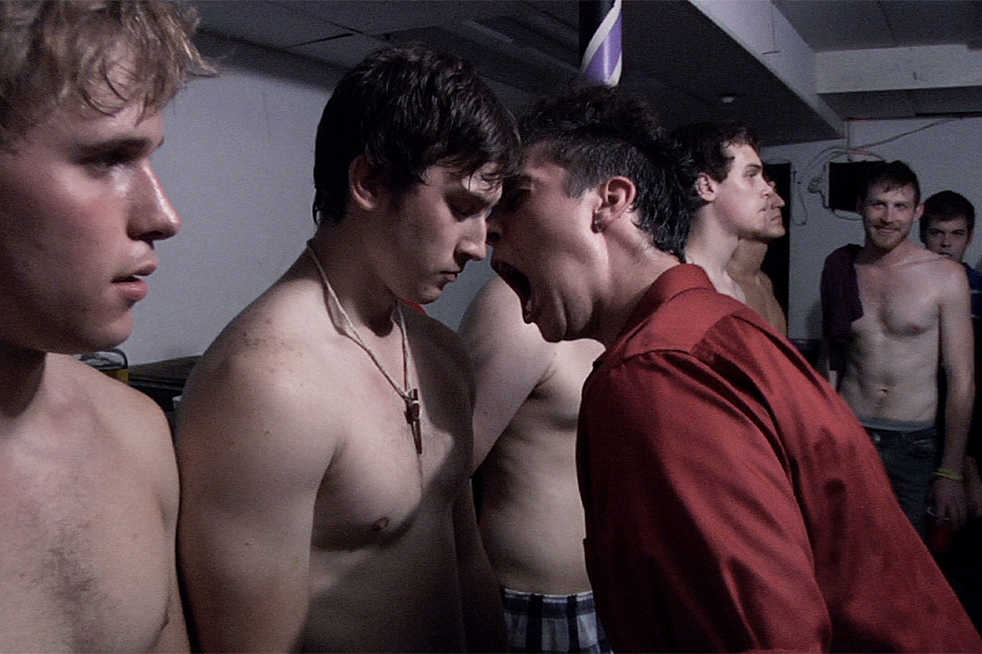From director and writer David Burkman comes “Haze,” a film that provides a dark view into the hazing process experienced by pledges to fraternities and sororities on college campuses. The story follows Nick (Kirk Curran, “Lily Déjà Vu”), a freshman who decides to join a fraternity. He must contend with his brother Pete’s (Mike Blejer, “Jay Dates”) mission to bring awareness to the brutality of hazing rituals which resulted in the death of a pledge.
The film cleverly frames the narrative about Greek life using ancient Greek mythology, explicitly including the highly fitting story of Dionysus, the god of wine, revelry and ecstasy, and implicitly using the tale of Narcissus and Echo.
It uses these myths while staying very true to the reality of college life. From the parties and the pressures of social acceptance to managing academics and relationships, students will find many of the scenes depicted in “Haze” familiar to their own experiences, which makes the immensely difficult-to-watch scenes of Hell Week and other hazing activities even more harrowing.
By using relatable characters in an entertaining movie as the vehicle to deliver the message of the dangers of hazing, Burkman hopes for the audience to come out of the campus screenings of the film prepared to have a discussion about the reality of this epidemic problem. The vast majority of the film depicts real experiences Burkman, and others ranging from those currently in college to those in their 30s or even 80s, had when pledging.
In an interview with Technique, Burkman discussed his motives and goals in making “Haze,” and its current college run, having been screened at over 20 campuses in the past two weeks.
“We recently partnered with The Georgia Tech Office of Greek Affairs to bring the film to campus, and the four governing Greek Councils hosted the screening in the Student Center Theater on the Georgia Tech campus on Saturday, Sept. 24th. A discussion about the issues the film raises followed the screening. This event was a part of National Hazing Prevention Week.”
While Hollywood has had many movies taking a comedic or campy-horror-film approach to the topic of fraternities and sororities, Burkman wanted to address the darker, more serious aspects of Greek life, which often go ignored or are shrouded in secrecy until consequences like death from alcohol poisoning result. The film attempts to depict and facilitate a dialogue about what hazing exactly is, and shows the less-discussed psychological and emotional toll hazing has on pledges.
“They don’t bring you down to the basement and start beating you up from day one, because nobody would stick around for that,” Burkman says.
“There’s a gradual ramping up where it’s not perceived as being hazed because it’s rather
subtle, with a punishment and reward cycle.”
When asked why he thinks hazing takes place, Burkman says, “There are very common human psychological underpinnings to all of this, but I think at its root, hazing is serving at least one if not many human psychological needs, and if we’re ever really seriously going to do anything about it, we need to understand what that need is that’s being served, and how can we serve those needs in healthy ways rather than these ways that are dangerous and harmful.”
The goal of screening “Haze” on college campuses is to allow the audience an opportunity to process the film and to spark a dialogue that will extend beyond the stunning revelation of the disconnect between people’s ideals and the reality offered by the final scene of the movie.
“The hope that we have is that we spark the beginnings of these conversations. I think ‘Haze’ is a powerful movie for a lot of people, and if it lingers in their minds, my hope is that they’ll continue to have these conversations on their own, and that organizations don’t just stop the conversation once we leave campus but continue searching for solutions.”
“Haze” has spent the past year on the film festival circuit, where it picked up several “Best Film” and “Best Screenplay” awards. After exclusively screening on college campuses across the country, “Haze” will be released commercially in the spring, with a limited theatrical run and release on digital and cable video on demand platforms.
